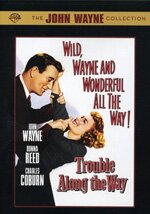Directed by Michael Curtiz

The few reviews found online of Trouble Along the Way, a 1953 movie starring John Wayne and Donna Reed, generally agree: fans of the Duke will likely enjoy it but its saccharine quality will probably be off-putting for anyone else. They also all seem to grade the movie as so-so, at best.
I can’t say I disagree with that assessment though, honestly, I liked the movie. It’s definitely sentimental. It’s sort of a romance that is not a romance, and a sports movie that isn’t a sports movie. And maybe that’s why the movie ends up being considered so-so. It’s not really sure what it wants to be.
I was a bit thrown at first because, based on the little I had read, I thought this would be a sports movie: John Wayne as coach of a luckless college football team that makes good. Given the year it was made (1953), I thought it might have been a precursor of sorts to the standard sport movie we see these days. You know the one: the big uplifting ending where everyone cheers as the guy or guys, gal or gals, triumph despite mountainous obstacles.
It was not that. It did, however, have a number of football scenes. (Interesting, too, seeing football before it evolved into what it is now. I’m pretty sure they were stock footage, however.)
As the movie starts, you might think you’re about to see a Bells of St. Mary’s kind of film, minus Bing Crosby and the singing. It focuses on Charles Coburn as Father Burke, the top banana at St. Anthony’s College. The college is struggling. Father Burke thinks it might be saved using the school’s football program (which is in pretty sad shape).
Enter the Duke, reluctantly. Wayne plays an ex-coach college football coach who has been banned from the major conferences. He has a big heart, however, hidden behind an occasionally gruff exterior (the usual John Wayne thing). But his focus in life is his daughter, a streetwise young girl who is equally devoted to her father. But Wayne is involved in a custody battle.
Enter Donna Reed, a Children’s Court officer who has a low opinion of Wayne and his parenting skills. Romantically, this is the basic set up: an antagonistic relationship that evolves as she eventually discovers Wayne isn’t the negligent father she thought.
The storylines interweave to a degree but overall come across as separate lines battling for attention. In the end, the sports line loses out. But it’s the sense of disparate parts that give the film a confused feel, despite the number of ways they connect. Is the movie about the romantic relationship or is it about the sports/save-the-school story?
Oddly, the movie was directed by Michael Curtiz, the man who gave us Casablanca. You get the sense, however, that this movie is a definite factory project. Go through the motions, cut it together and get it out fast.
And yet, it curiously has its charm. It’s a hard movie to defend, but it’s also difficult to slam it. It’s a middling movie. It’s charm comes largely from three elements: 1) John Wayne’s performance, 2) the on screen relationship between Wayne and his daughter and, finally, 3) Charles Coburn’s Father Burke – a cliché, yes, but a winning one, at least in the context of a movie of that period.
Speaking of period, the movie is also worth seeing for this aspect. It reflects pretty well the Hollywood ideal of America of that time (1953) which, I think, reflected pretty well how average people wanted to see America back then. Realistic? Nope, but few people go the movies to see reality portrayed.
2 stars out of 4.
Two last comments:
- I need to watch the ending again. It confused me but I’m not sure if that’s because the ending is actually confusing or I was distracted by a dog that wanted to go outside.
- I find the title Trouble Along the Way baffling. How does that relate to anything we see on screen? What does it mean



1 Response